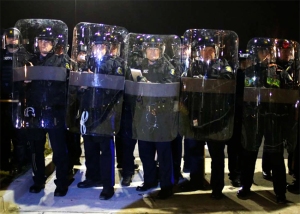Every post about an ugly subject needs an ugly picture; the one below is my pick. It’s one of dozens we’ve seen in the news of cops doing despicable things. Who knows why they detained this poor bastard? Maybe he was just pedaling by, and they needed to verify that their canisters of pepper spray were correctly primed.

Never again will I tolerate the apologist who says, “You know the media. They just pick out a few bad apples among hundreds of good cops.” Stomach acid and rage will ensue. Do apologists know about the surge in police resignations since George Floyd’s murderer was charged? Have they heard about the 57 Buffalo cops who quit their force’s emergency response team? They were upset because two of their buddies were disciplined for knocking down an elderly man in their path.
The common public perception of the police — Baltimore’s, Minneapolis’s, Houston’s, Albuquerque’s, LA’s, you name it — is diametrical to reality. The police today are indeed a “force.” They are a paramilitary force, a cultural force, a labor force, a political force, and ironically, an extralegal force.
Not too many decades ago, the police had no tasers. They had tear gas but no pepper spray. They had fire hoses but no stun grenades. They had batons but no rubber bullets. They had megaphones but no LRADs (Long Range Acoustic Devices), commonly known as “sound cannons.” At a distance of 15 meters, anyone in its audio path will suffer great pain and possibly permanent hearing loss; at 300 meters, severe headaches.
It used to be rare to see a police force backed up by the National Guard, and never by regular military personnel in tanks and helicopters. Now the police are virtually an arm of the U.S. military. How did they ever maintain the peace before they became imitation soldiers?
The police are a culture unto themselves. In one respect, they’re like the Mafia: snitching on a “family” member is absolutely forbidden by their fraternal code. And if an officer is pounding on some innocent schmuck, his colleagues are obliged to stand aside or, better, join in the mayhem. It’s what buddies do.
Their culture often includes guest members, like the DA’s office and the mayor’s office. Bringing criminal charges against a cop does not go down well in a predominantly white community that relies on cops to protect and serve. It’s not lost on mayors and most DAs that they serve at the pleasure of the voters.
Like all unions, police unions are concerned with improving the safety and prosperity of their members, though they needn’t be overly diligent. White communities are grateful for police work, and all the cop shows on TV tell them they should be. Unlike other unions, police unions craft employment contracts that let cops escape accountability for egregious conduct. A Washington Post study in 2006 found that fully a quarter of cops fired for misconduct were reinstated after they were accorded the forgiving review procedure in their union contracts.
Police associations make political endorsements, even though the police belong to the executive arm of government. Imagine the FBI, CIA, or our armed forces endorsing a candidate for federal office! It would be a catastrophe, the end of our republic. Should the executive arm of a state or locality be any different? Nevertheless, the police do it, and pity the politician who gets the “soft on crime” label or some other resonant curse. It pays them to be on the kindly side of the police by blessing contracts that require leniency for police misconduct.
If cops do something provably criminal, say something corroborated by videos and tattle-tale buddies, they still have a lovely ace in the hole. It’s a legal doctrine called qualified immunity, introduced by the Supreme Court in 1967. It grants public officials immunity in civil suits if they’ve done something abhorrent but the law about their behavior is a bit fuzzy. For example, take the case of a pregnant Seattle woman who was repeatedly tasered when she refused to sign a speeding ticket. The police officer in question was given qualified immunity because the law on stun gun use wasn’t entirely clear. Never mind the use of excessive force, which was clearly demonstrable.
Naturally, recent police outrages have renewed calls for an end to qualified immunity. Last week, the Supreme Court acted preemptively by declaring it will not hear cases that request a reexamination of the doctrine. Just like SCOTUS to slink away from a crying need for judicial review.
It’s plain that policing has to be reformed in a uniform way across the country, not just in this city or that city. The headline “Minneapolis Bans Chokeholds” sounds like progress, but it means very little. What about Dubuque? They might allow chokeholds, but perhaps they take a dim view of stomping.
Reforms, therefore, must devolve from the federal government. Otherwise, we’ll get more of what we’ve always had, an unequal application of justice across the land. The situation is much like allowing each state to establish its own voting laws — civil liberty is respected in some places and disrespected in others.
Sorry, but we need a new federal bureaucracy. Call it the Bureau of Police Affairs (BPA) or something similar. It probably belongs within the Justice Department. (I know — Barr has a talent for fucking up both what we have and what we need.)
Here’s what I see as the BPA’s charter:
-
- Create a police training course and keep it current. Write a Policing Bible to go with it. The Bible will contain dozens of scenarios that give examples of good and bad policing.
-
- Hire a cadre of police instructors to run the courses. How to train police officers will no longer be a local decision.
-
- Create procedures for hiring, disciplining, firing, and reinstating police officers. Specify that no police or municipal official may sit on a disciplinary board if an officer is accused of misusing deadly force.
-
- Create an attachment to police union contracts that enumerates the rights of officers accused of misconduct. It will supersede any other contractual reference to that subject.
-
- Maintain a database of citations of police misconduct and check it whenever a police department sends a “request to hire” notification (a new requirement). Grant or deny the request.
That’s a boatload of authority to bestow on any government agency. The BPA could survive a court challenge only if were created by an act of Congress that was signed by the president. Even then, its legitimacy might be struck down by the Supreme Court, but more about that latter.
While Congress is creating the BPA, it must pass this complementary legislation:
-
- A law that spells out the meaning of “excessive force” and rejects the use of qualified immunity whenever its standard of excessive force is met.
-
- A law that prohibits any group that does police work from endorsing a political candidate.
-
- A law that creates the legal machinery for staffing police review boards on which no police or municipal official sits.
I’ve proposed a BPA, a charter for it, and a Congress that makes sweeping police reforms because street protests alone will never, of themselves, reshape our country’s malformed police establishment. That can only be done with ballots — ballots that put in place a progressive Senate, a new president and, by extension, a new Attorney General and sensible additions to the Supreme Court. (A radicalized Congress would, I hope, impeach and convict at least two of our justices.)
Democracies must continually save themselves in cycles of outrage and reform. If they fail at this task, they degrade and die. If we fail in November, we will have shown a lethal disregard for our lives, our liberties, and our happiness.

